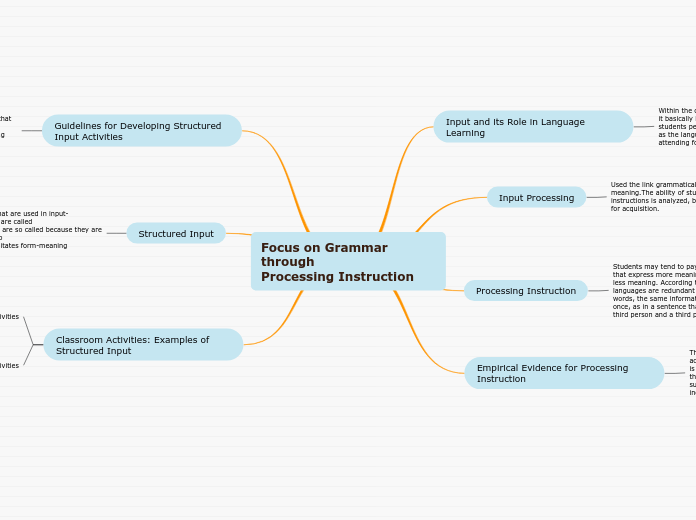Focus on Grammar through
Processing Instruction
Input and its Role in Language Learning
Within the context of learning the English language, it basically includes grammar and the way in which students perceive information. Input can be defined as the language "that students hear or see those attending for their propositional content.
Input Processing
Used the link grammatical forms to their meaning.The ability of students to process instructions is analyzed, because learners need input for acquisition.
Processing Instruction
Students may tend to pay more attention to forms that express more meaning than those that express less meaning. According to VanPatten, natural languages are redundant characteristics. In other words, the same information is encoded more than once, as in a sentence that contains a subject in the third person and a third person in singular.
Empirical Evidence for Processing Instruction
The processing instruction points to language acquisition in the initial stage of pro-cessing, which is input processing. This instruction not only affects the student also affects their underlying system in such a way that they will eventually be able to incorporate the target form into their output.
Guidelines for Developing Structured Input Activities
Some famous researchers have all emphasized that these guidelines are important and should be considered in designing effective input processing materials.
Keep Meaning in Focus
Present One Item at a Time
Use Oral and Written Input
Move from Individual Sentences to Connected Discourse
Have Learners Do Something with the Input
Keep Learners’ Processing Strategies in Mind
Structured Input
Classroom Activities that are used in input-processing instruction are called
structured input. They are so called because they are specifically designed to
contain input that facilitates form-meaning connections.
Classroom Activities: Examples of Structured Input
Referential Activities
The aim is to help learners
with the acquisition of English past and future tenses, respectively. The third
activity facilitates learning causative constructions
Affective activities
Requires learners to express their opinion and do not
have right or wrong answers. They can be used with students in a lower intermediate level class. The aim o is to process the present and past participle adjectives. The activities can be conducted orally or in written forms.
